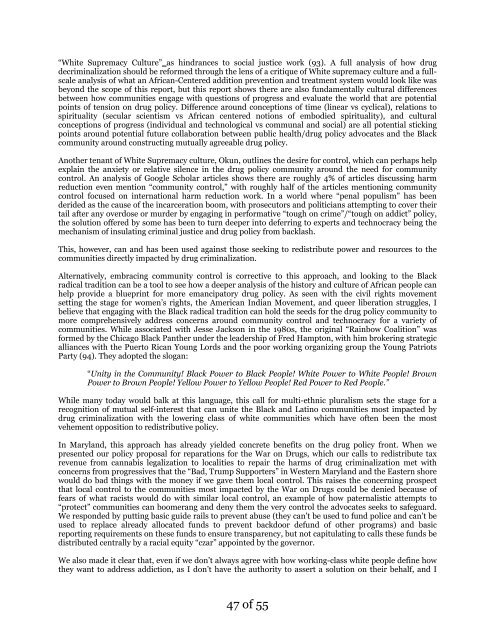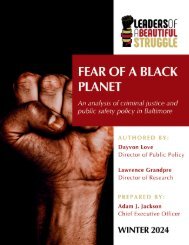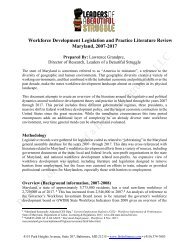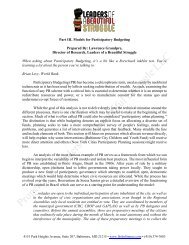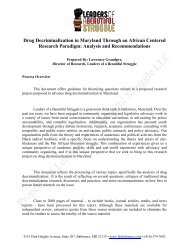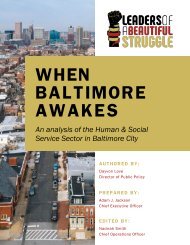The Communal Impacts of Drug Criminalization in Maryland
This project attempts to reframe the harms of drug criminalization. Influenced by African-Centered Research Methodologies, we engaged in a literature review and qualitative research of the communal impacts of drug decriminalization in Maryland, with a specific focus on Baltimore.
This project attempts to reframe the harms of drug criminalization. Influenced by African-Centered Research Methodologies, we engaged in a literature review and qualitative research of the communal impacts of drug decriminalization in Maryland, with a specific focus on Baltimore.
You also want an ePaper? Increase the reach of your titles
YUMPU automatically turns print PDFs into web optimized ePapers that Google loves.
“White Supremacy Culture” as h<strong>in</strong>drances to social justice work (93). A full analysis <strong>of</strong> how drug<br />
decrim<strong>in</strong>alization should be reformed through the lens <strong>of</strong> a critique <strong>of</strong> White supremacy culture and a fullscale<br />
analysis <strong>of</strong> what an African-Centered addition prevention and treatment system would look like was<br />
beyond the scope <strong>of</strong> this report, but this report shows there are also fundamentally cultural differences<br />
between how communities engage with questions <strong>of</strong> progress and evaluate the world that are potential<br />
po<strong>in</strong>ts <strong>of</strong> tension on drug policy. Difference around conceptions <strong>of</strong> time (l<strong>in</strong>ear vs cyclical), relations to<br />
spirituality (secular scientism vs African centered notions <strong>of</strong> embodied spirituality), and cultural<br />
conceptions <strong>of</strong> progress (<strong>in</strong>dividual and technological vs communal and social) are all potential stick<strong>in</strong>g<br />
po<strong>in</strong>ts around potential future collaboration between public health/drug policy advocates and the Black<br />
community around construct<strong>in</strong>g mutually agreeable drug policy.<br />
Another tenant <strong>of</strong> White Supremacy culture, Okun, outl<strong>in</strong>es the desire for control, which can perhaps help<br />
expla<strong>in</strong> the anxiety or relative silence <strong>in</strong> the drug policy community around the need for community<br />
control. An analysis <strong>of</strong> Google Scholar articles shows there are roughly 4% <strong>of</strong> articles discuss<strong>in</strong>g harm<br />
reduction even mention “community control,” with roughly half <strong>of</strong> the articles mention<strong>in</strong>g community<br />
control focused on <strong>in</strong>ternational harm reduction work. In a world where “penal populism” has been<br />
derided as the cause <strong>of</strong> the <strong>in</strong>carceration boom, with prosecutors and politicians attempt<strong>in</strong>g to cover their<br />
tail after any overdose or murder by engag<strong>in</strong>g <strong>in</strong> performative “tough on crime”/“tough on addict” policy,<br />
the solution <strong>of</strong>fered by some has been to turn deeper <strong>in</strong>to deferr<strong>in</strong>g to experts and technocracy be<strong>in</strong>g the<br />
mechanism <strong>of</strong> <strong>in</strong>sulat<strong>in</strong>g crim<strong>in</strong>al justice and drug policy from backlash.<br />
This, however, can and has been used aga<strong>in</strong>st those seek<strong>in</strong>g to redistribute power and resources to the<br />
communities directly impacted by drug crim<strong>in</strong>alization.<br />
Alternatively, embrac<strong>in</strong>g community control is corrective to this approach, and look<strong>in</strong>g to the Black<br />
radical tradition can be a tool to see how a deeper analysis <strong>of</strong> the history and culture <strong>of</strong> African people can<br />
help provide a bluepr<strong>in</strong>t for more emancipatory drug policy. As seen with the civil rights movement<br />
sett<strong>in</strong>g the stage for women’s rights, the American Indian Movement, and queer liberation struggles, I<br />
believe that engag<strong>in</strong>g with the Black radical tradition can hold the seeds for the drug policy community to<br />
more comprehensively address concerns around community control and technocracy for a variety <strong>of</strong><br />
communities. While associated with Jesse Jackson <strong>in</strong> the 1980s, the orig<strong>in</strong>al “Ra<strong>in</strong>bow Coalition” was<br />
formed by the Chicago Black Panther under the leadership <strong>of</strong> Fred Hampton, with him broker<strong>in</strong>g strategic<br />
alliances with the Puerto Rican Young Lords and the poor work<strong>in</strong>g organiz<strong>in</strong>g group the Young Patriots<br />
Party (94). <strong>The</strong>y adopted the slogan:<br />
“Unity <strong>in</strong> the Community! Black Power to Black People! White Power to White People! Brown<br />
Power to Brown People! Yellow Power to Yellow People! Red Power to Red People.”<br />
While many today would balk at this language, this call for multi-ethnic pluralism sets the stage for a<br />
recognition <strong>of</strong> mutual self-<strong>in</strong>terest that can unite the Black and Lat<strong>in</strong>o communities most impacted by<br />
drug crim<strong>in</strong>alization with the lower<strong>in</strong>g class <strong>of</strong> white communities which have <strong>of</strong>ten been the most<br />
vehement opposition to redistributive policy.<br />
In <strong>Maryland</strong>, this approach has already yielded concrete benefits on the drug policy front. When we<br />
presented our policy proposal for reparations for the War on <strong>Drug</strong>s, which our calls to redistribute tax<br />
revenue from cannabis legalization to localities to repair the harms <strong>of</strong> drug crim<strong>in</strong>alization met with<br />
concerns from progressives that the “Bad, Trump Supporters” <strong>in</strong> Western <strong>Maryland</strong> and the Eastern shore<br />
would do bad th<strong>in</strong>gs with the money if we gave them local control. This raises the concern<strong>in</strong>g prospect<br />
that local control to the communities most impacted by the War on <strong>Drug</strong>s could be denied because <strong>of</strong><br />
fears <strong>of</strong> what racists would do with similar local control, an example <strong>of</strong> how paternalistic attempts to<br />
“protect” communities can boomerang and deny them the very control the advocates seeks to safeguard.<br />
We responded by putt<strong>in</strong>g basic guide rails to prevent abuse (they can’t be used to fund police and can’t be<br />
used to replace already allocated funds to prevent backdoor defund <strong>of</strong> other programs) and basic<br />
report<strong>in</strong>g requirements on these funds to ensure transparency, but not capitulat<strong>in</strong>g to calls these funds be<br />
distributed centrally by a racial equity “czar” appo<strong>in</strong>ted by the governor.<br />
We also made it clear that, even if we don’t always agree with how work<strong>in</strong>g-class white people def<strong>in</strong>e how<br />
they want to address addiction, as I don’t have the authority to assert a solution on their behalf, and I<br />
47 <strong>of</strong> 55


